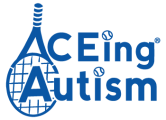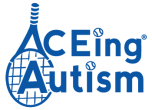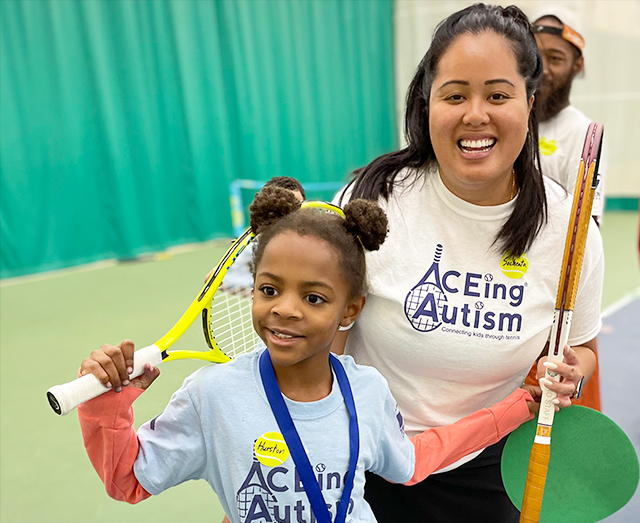Meet Hurston Harrington, an athletic and coordinated 9 year old participant from our Southeast Washington program, who has been with ACEing Autism for three sessions! “I was just happy to have her run around, but she seemed to really take to it, and that’s always exciting if they like something,” Joy Harrington, her mother said.
Diagnosed with autism around three years old, Hurston’s main hurdle has been speech but she has worked very hard at it and has improved a lot. Even though talking hasn’t come easy to her, she has always found a way to communicate with others. “We know how she’s feeling by her hums. There’s the happy hum, the angry hum, a sad hum. If she’s skipping and waving her arms, I know that she’s excited and having fun!” Joy explained.
Hurston, and her twin brother Marsalis, were both eager to try tennis. “It was a challenge for both of them, but she seemed to be a natural. She really took to it, not hesitating to try the different drills,” Joy said. “Dad and I wanted them to try some sports but were concerned that most programs wouldn’t accomodate kids like ours. You can’t just shout instructions and expect the kids to immediately comply. Not having to explain my kids here was a big thing!”
With three sessions under their belt, Joy has seen some improvements she is excited about. “Hurston has always been athletic but with ACEing Autism, it was nice to see her approach new challenges. For instance, it’s one thing to throw and catch a ball with your hands, but another to use a racquet, which isn’t part of your body, to make contact with the ball,” she said proudly. She then continued that “ACEing Autism helped in terms of retaining skills even if she hasn’t done it in a while. It takes a lot of repetition to retain complex skills. I didn’t know if she would retain things but here she did. To see, months later, that she remembered how to volley was very cool!”
Even more important is watching them grow and get better at managing frustration and disappointment. Like any kid, Hurston can get upset when things don’t go her way. Since words can be hard to get out quickly to express her frustration, she may shriek or tantrum instead. “With the tennis drills, of course she can’t always do the skills on the first try, but now she recognizes it’s a drill, and an opportunity to try again. Over time, she’s adapted wonderfully. Not being great right away is not such a big deal.”
In addition to seeing improvements on the court, Joy has also felt like she can relax more throughout the hour. “Over time, I’ve become way less involved. I think a lot of parents in our situation feel like ‘Only I know how to manage my kid, so I must be ready to intercede at any time.’ We have to let go a little bit. I was like that at first, but now I’m only intervening when they really need it, and let the coaches handle it otherwise.” She has also loved seeing her children connect with the coaches, and sometimes with their peers.
As we concluded our interview, Joy wanted to share, especially during Women’s History Month, that it’s important for people to recognize that girls are autistic too. It’s not exclusively a boy thing. While Hurston and her twin brother are both autistic, their autism doesn’t look exactly the same. And neither is more or less autistic than the other. “Autism comes in all colors, genders, cultures, special interests, challenges, and strengths. It’s amazing to see how different my own children are.”
She looks forward to continuing ACEing Autism and seeing her children interact with their coaches and learn new skills!





